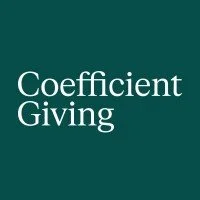Coefficient Giving
Members
Amanda Hungerford
Farm Animal Welfare Program Officer, Coefficient Giving
Lewis Bollard
Farm Animal Welfare Program Director, Coefficient Giving
Why does Coefficient Giving give to end factory farming?
At any given moment, an estimated 100 billion vertebrate animals are suffering on factory farms around the world. If you value their welfare even a little bit, it’s a moral atrocity. Despite the size of the problem, there’s strong evidence that it’s also highly tractable. Advocates have won reforms that have helped over a billion animals - and will help billions more in the future. These wins can and will scale with additional philanthropic investment.
However, factory farming is an area that’s been historically neglected by funders. Less than 400 million USD in philanthropy goes to support all work to help farmed animals globally each year - that’s less than the budget of many individual organizations that are working on conservation, climate change, education, healthcare, etc.
At Coefficient Giving, our mission is to help others as much as we can with the resources available to us. Factory farming’s immense scale, the tractability of the problem, and its relative neglect makes it an issue where philanthropic resources can have a huge impact. We encourage any funder to seriously consider the factory farming issue as an opportunity for high-impact philanthropy.
“We encourage any funder to seriously consider the factory farming issue as an opportunity for high-impact philanthropy.”
How did your organization's leadership decide to join Senterra?
We’re proud to say that Coefficient Giving has been a member since the very beginning - we were part of the group that founded Senterra Funders (then Farmed Animal Funders). The first funders’ meeting was held in 2017, at the Animal Rights National Conference, and it was immediately obvious how valuable the group would be in uniting major funders who hadn't crossed paths before.
How does Coefficient Giving and its staff benefit from Senterra membership?
First, we learn about new approaches to fight factory farming, both from Senterra’s programing and from conversations with other members. It’s also a way for us to share what we’ve learned.
Second, we connect with other funders. Through membership in Senterra Funders, we’ve developed mutually beneficial relationships where we exchange information, ideas, and experiences.
Finally, being part of Senterra has given us opportunities for co-funding - increasing our impact and reach.
Since your organization has been with Senterra from the beginning, are there any observations about its growth that you’d like to share?
Perhaps half of the group's current members weren't yet funding in the farm animal welfare space at all in 2017, when the group started. So there's been a relatively large increase in funders in the space in a short period of time. It’s very gratifying to see how Senterra’s programming and community have helped to build our movement, and has created opportunities for funders to collaborate and share knowledge, where otherwise they may not have.
Is there anything you’d like to share with funders who are interested in joining Senterra?
While Coefficient Giving is a big foundation, most Senterra members are individual donors, and many are new to the space. We've really enjoyed the range of perspectives we get from Senterra’s membership, which is diverse in funding size, approach, and focus - there’s room for all Senterra Funders members to play an active role in this community.





